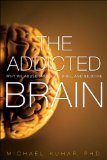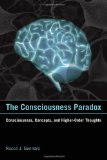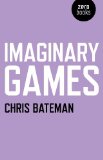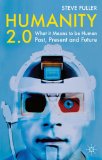November 30, 2011

The Addicted Brain: Why We Abuse Drugs, Alcohol, and Nicotine (FT Press Science) by Michael Kuhar (FT Press, 2011)
(kindle ed.), (amazon.co.uk)
Product description from the publisher:
What Science Has Learned About Addiction:
What causes it?
How do drugs change the brain?
Who’s most vulnerable?
Does treatment work?
What can we do?
Addiction destroys lives. In The Addicted Brain, a leading neuroscientist explains how and why this happens–and presents advances in treatment and prevention. Using breathtaking brain imagery and other research, Michael Kuhar, Ph.D., shows the powerful, long-term brain changes that drugs can cause, revealing why it can be so difficult for addicts to escape their grip.
In plain English, Kuhar describes why some people are far more susceptible to addiction than others. He illuminates striking neural similarities between drugs and other pleasures potentially capable of causing abuse or addiction–including alcohol, gambling, sex, caffeine, and even Internet overuse. Finally, he outlines the 12 characteristics most often associated with successful treatment.
Authoritative and easy to understand, The Addicted Brain offers today’s most up-to-date scientific explanation of addiction–and what addicts, their families, and society can do about it.
See also: Author’s homepage
Google Books preview:
Comments (0)
- cognitive science,new books,psychology
November 29, 2011

The Consciousness Paradox: Consciousness, Concepts, and Higher-Order Thoughts (Representation and Mind series) by Rocco J. Gennaro (MIT Press, 2011)
(kindle ed. – Nov 17, 2011), (amazon.co.uk – 20 Jan 2012)
Product description from the publisher:
Consciousness is arguably the most important area within contemporary philosophy of mind and perhaps the most puzzling aspect of the world. Despite an explosion of research from philosophers, psychologists, and scientists, attempts to explain consciousness in neurophysiological, or even cognitive, terms are often met with great resistance. In The Consciousness Paradox, Rocco Gennaro aims to solve an underlying paradox, namely, how it is possible to hold a number of seemingly inconsistent views, including higher-order thought (HOT) theory, conceptualism, infant and animal consciousness, concept acquisition, and what he calls the HOT-brain thesis. He defends and further develops a metapsychological reductive representational theory of consciousness and applies it to several importantly related problems. Gennaro proposes a version of the HOT theory of consciousness that he calls the “wide intrinsicality view” and shows why it is superior to various alternatives, such as self-representationalism and first-order representationalism. HOT theory says that what makes a mental state conscious is that a suitable higher-order thought is directed at that mental state. Thus Gennaro argues for an overall philosophical theory of consciousness while applying it to other significant issues not usually addressed in the philosophical literature on consciousness. Most cognitive science and empirical works on such topics as concepts and animal consciousness do not address central philosophical theories of consciousness. Gennaro’s integration of empirical and philosophical concerns will make his argument of interest to both philosophers and nonphilosophers.
See also: Works by Rocco J. Gennaro at PhilPapers, Author’s homepage (links to book’s table of contents, chapter 1, and acknowledgments)
Comments (2)
- cognitive science,consciousness,new books
November 26, 2011

Imaginary Games by Chris Bateman (Zero Books, John Hunt, 2011)
(kindle ed.), (amazon.co.uk)
Book description from the publisher:
Can games be art? When film critic Roger Ebert claimed in 2010 that videogames could never be art it was seen as a snub by many gamers. But from the perspective of philosophy of art this question was topsy turvey, since according to one of the most influential theories of representation all art is a game. Kendall Walton’s make-believe theory explains how we interact with paintings, novels, movies and other artworks in terms of imaginary games, like a child’s game of make-believe, wherein the artwork acts as a prop prescribing specific imaginings. In this view there can be no question that videogames – in fact, all games – are indeed a strange and wonderful form of art. In Imaginary Games, game designer and philosopher Chris Bateman expands Walton’s theory to videogames, board games, collectible card games such as Pokémon and Magic: the Gathering, and role-playing games like Dungeons & Dragons. The book explores the diverse fictional worlds that influence the modern world, the ethics of games, and the curious role imagination plays in everything from religion to science and mathematics.
See also: Author’s blog, book excerpt: “What Is a Game?”
Google Books preview:
Comments (0)
- culture,new books
November 22, 2011

Humanity 2.0: What it Means to be Human Past, Present and Future by Steve Fuller (Palgrave Macmillan, 2011)
(amazon.co.uk)
Product description from the publisher:
Social thinkers in all fields are faced with one unavoidable question: what does it mean to be ‘human’ in the 21st century? As definitions between what is ‘animal’ and what is ‘human’ break down, and as emerging technologies such as artificial intelligence and nano- and bio- technologies develop, accepted notions of humanity are rapidly evolving.
Humanity 2.0 is an ambitious and groundbreaking book, offering a sweeping overview of key historical, philosophical and theological moments that have shaped our understandings of humanity. Tackling head on the twin taboos that have always hovered over the scientific study of humanity – race and religion – Steve Fuller argues that far from disappearing, they are being reinvented.
Fuller argues that these new developments will force us to decide which features of our current way of life – not least our bodies – are truly needed to remain human, and concludes with a consideration of these changes for ethical and social values more broadly.
See also: Guardian/Observer interview: “Steve Fuller: it’s time for Humanity 2.0”
Comments (0)
- culture,new books
November 19, 2011
“If science may crudely be said to be the drive to know the world objectively and art is pre-eminently an arena of subjective self-expression, religion typically addresses both sides of the subject-object relationship by connecting what is inside each of us to something outside.”
–Keith Hart, foreword to Ritual and Religion in the Making of Humanity by Roy A. Rappaport, p. xv
Comments (0)
- aside






